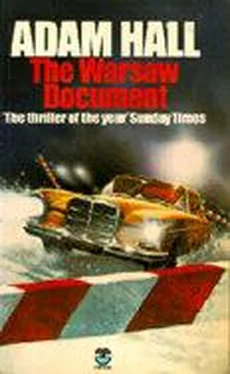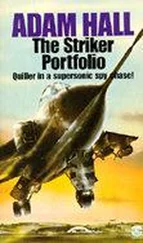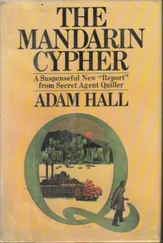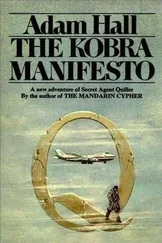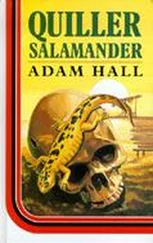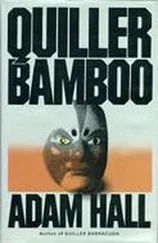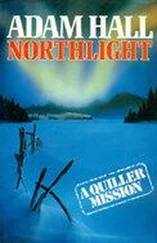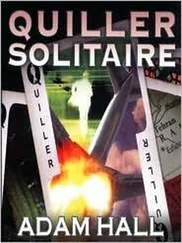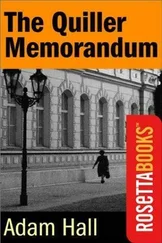It was going to be difficult.
'Have you got some paper, an old envelope or something'
He rummaged in the glove pocket 'Will this do?'
We cleared the lights.
The M.O. patrol was three cars ahead of us and the 220 immediately behind. It was a year-old leaflet, Jazz Gala at the Andrzej Kurylowicz Wine-cellar, but the back was plain. Writing wasn't easy because we were meeting with cross ruts at the intersections but he wouldn't be fussy. When I'd finished I folded it twice.
Warsaw Central Station.
'You only have five minutes.'
'There's time.'
'Get your ticket at the other end. It is permitted.'
Warsaw Central was busier than Wilenska and I began watching the breaks as soon as I was in the main hall, aware of conflicting needs: the need to make a quick flush because time was running out and the need to protect the overall operation from the risk of a precipitate move.
Two main entrances and three gates towards the platform area, upwards of a hundred people and a lot of them in groups of three or more, bookstall, Orbis kiosk, island cafeteria, static and mobile cover, say seventy-five per cent in normal conditions but he was being so bloody windy, wouldn't give me a chance.
There was another factor now coming into play: my movements were surveyed and they didn't have to be aimless. Take a taxi to a station but I couldn't just loaf around and walk away again: they wouldn't like that. On the other hand I didn't have anywhere to go except to the unknown place where in a minute from now or an hour from now I'd try for the break.
Purpose-tremor was setting up in the muscles, normal but hazardous: my feet felt light and I breathed as if I'd been running. Check and decide and in deciding remember that the whole of the mission hangs on this and that he's up there rubbing his bloody chilblains waiting for the phone to ring so for Christ's sake don't go and muck it just because the nerves are overtuned.
Two at each main entrance, two splitting up and bracketing the cafeteria blind spot, two going down to the ticket barriers at three and nine o'clock from centre, all minor exits covered. This wasn't a box. It was a net. These were elite Muscovites, trained till they ticked like a clock; they may have been in force to this extent round the Hotel Kuznia or held back in reserve until the movement report had gone in. The thing was that within ten paces of the entrance where I'd come in they'd deprived me of visual cover. Their specialised field overlapping a neighbouring discipline: the observation of V.I.Ps. in public places; the two jobs had various factors in common and the chief of these was geometry: they moved to their stations as if instructed by the computed findings of compass and protractor; they knew the distance I'd have to go before the island cafeteria obscured me from points A and B, the angle subtended by the view of C and D, the sector through which I could move under observation from E. F and G before the A and B zones picked me up again.
They didn't see the cafeteria or the bookstall or the ticket-gates: they saw vectors, diagonals, tangents. It amounted to this: if each man were a spotlight I would have no shadow.
All I needed to do was get where just for ten seconds they couldn't see me and they knew it and they weren't going to let me so I crossed to the bookstall and bought a noon edition of Zycie Warsawy and gave the woman the leaflet I'd folded in four.
'Would you be kind enough to keep this for a moment? A friend of mine will ask you for it.'
I offered ten zlotys but she shook her head, putting the message in the inside pocket of her lambswool coat. 'Will he give his name?'
'No, but he's a Russian gentleman; you'll know him by his accent.'
I didn't look back until I'd reached the cafeteria towards the far side of the hall. One of them was already there at the bookstall.
'Kawa, prosze.'
The girl pulled a waxed-paper cup from the column. They hadn't necessarily seen me pass it but they'd seen me talking to the woman and a station bookstall is one of the classic letter-drops.
I estimated that he'd get it within ten minutes.
Two birds: my movements were surveyed and mustn't be aimless and this was what I could have come here for; and it would keep him happy for a few more hours.
'Dziekuje.'
I stirred it.
All going well. You'll be glad you co-operated. I shall see you this evening either at the Praga Commissariat or the Hotel Cracow, in time for you to take all necessary action.
They wouldn't know it was for Foster but that was where they'd send it, immediate attention. He was crossing over to the row of telephone kiosks now and one of his team was shifting obliquely to cover his p.o.v. I sipped my coffee.
Most of the time would be taken up in spelling the thing out and if it had been something I'd wanted to hurry I'd have written it in Russian but there was no hurry needed and I was damned if an ex-scholar of the Basingstoke Elementary was going to write a note to an Old Etonian in Slavonic hieroglyphs, the English are born snobs.
Analyse the data, make the decision, act.
He was coming out of the phone-box but he wasn't resuming station and the pattern had changed. I hadn't expected that. Absorb new data. He was a short man with a small head and a sloping walk and his shoes were quiet as he came and he came looking at no one, looking everywhere but at no one, not at me.
Panic tried getting in but I took a slow breath: the answer to panic is prana. Immediate construction: I'd misjudged the conditions. Foster had decided that I was leaving it too late — I'd said "this evening" — and that he'd settle for the info I'd collected since he'd let me run, without waiting for the rest. He was edgy about the H-hour for Sroda; they all were; they'd pulled in enough Czyn people to know that Sroda would begin at midnight plus one, eleven hours and thirty-one minutes from now. We have stockpiles strategically dispersed, sub-guns, grenades, land-mines, you name it. Wednesday morning, 0001 hours, the three main generating stations hit the sky. Will you be here? Don't be here Wednesday, pal. The station at Tamka wouldn't go up because they'd wiped out the unit there but in other places, other buildings, there'd be radio-controlled detonators still set up and the U.B. knew it. The U.B., the K.G.B. and Foster. His problem was simple and it was acute: he'd got to balance the risk that I was working against him with the hope that I was working for him, and as the time ran out he'd be driven to a compromise.
The man with the sloping walk looked at me now as he came. I heard the faint squeezed sound from his crepe-rubber soles. He stopped.
'Do you speak Russian?'
'Yes.'
He pulled a cheap plastic-covered notebook out of his black leather coat, finding the page. His breath smelt of czosnek.
'Listen please. "Good of you to get in touch but you're leaving it too late. We'll have to meet earlier than this evening. The orders are to immobilise you at four o'clock, so do what you can before then." ' His small head lifted. 'Do you understand?'
'Yes.'
'Do you wish to send a reply?'
'No.'
'Very well.'
I watched him go back to his station.
Seven minutes. Call it half that for the field-to-base transmission including his walk to the bookstall and from there to the telephone: it was good communication. On the move in a capital city with a travel pattern that could take me five or six miles from receiver-base I could hand in a signal to anyone, bookseller, road sweeper, barman, or just drop it on the ground, and within an average of three and a half minutes Foster would be reading it.
He was as close to me as that.
Time was 12:31 and I made it an overt movement, checking my watch with the station clock as I walked from the cafeteria to the ticket-gate area. Of course it was logical: blind instinct is a contradiction in terms. There was more chance of a break, of making a break, in a mainline station than in the streets; a fair percentage of the place-feel had reached the brain through the feet: this was one of the few extensive areas in the city where a running man wouldn't slip on snow. The rest had been visual and deductive: the sight of blind spots, obstacles, ticket-barriers, the awareness that patterns would change and provide opportunities as groups of people moved and the trains came in and went out. The trains particularly: in half a minute they'd throw a wall across the scene and in half a minute knock it down again; a street was static and its confines predictable.
Читать дальше
